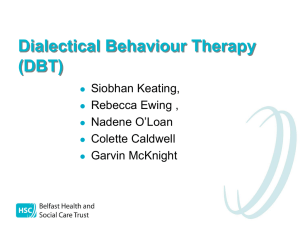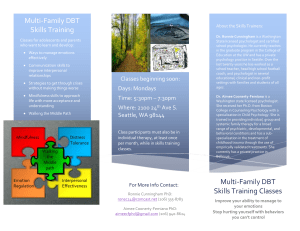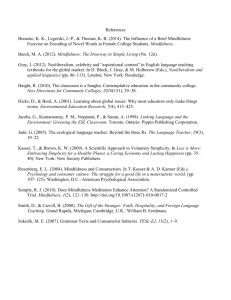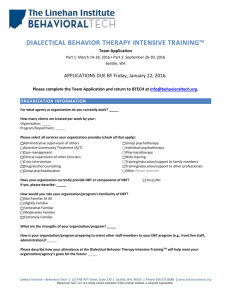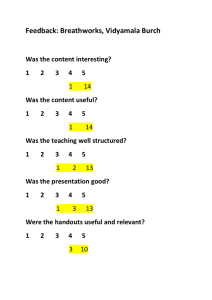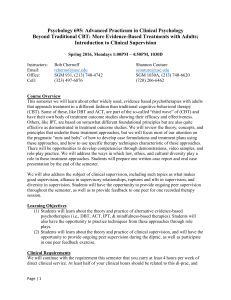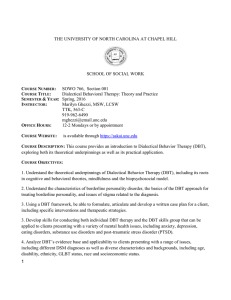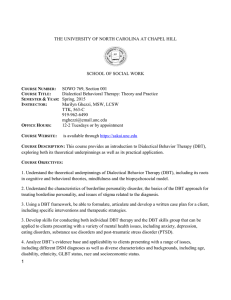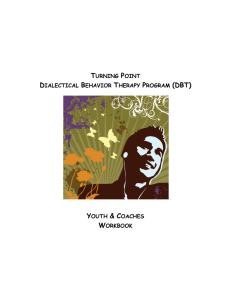Syllabus - the Department of Psychology at Illinois State University
advertisement
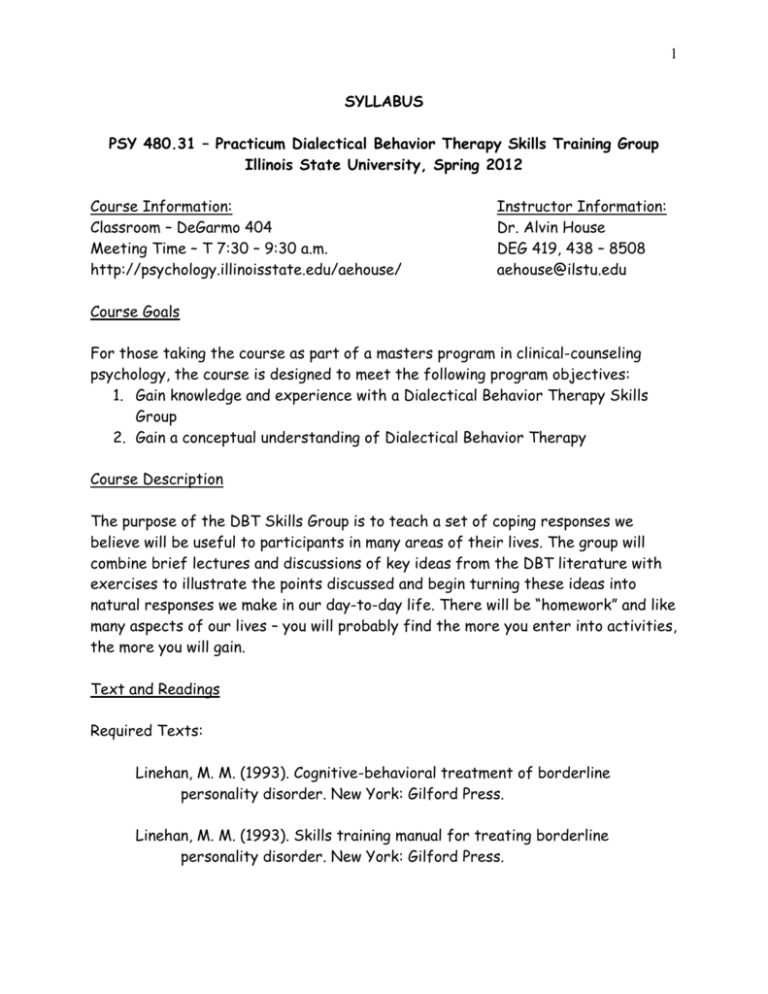
1 SYLLABUS PSY 480.31 – Practicum Dialectical Behavior Therapy Skills Training Group Illinois State University, Spring 2012 Course Information: Classroom – DeGarmo 404 Meeting Time – T 7:30 – 9:30 a.m. http://psychology.illinoisstate.edu/aehouse/ Instructor Information: Dr. Alvin House DEG 419, 438 – 8508 aehouse@ilstu.edu Course Goals For those taking the course as part of a masters program in clinical-counseling psychology, the course is designed to meet the following program objectives: 1. Gain knowledge and experience with a Dialectical Behavior Therapy Skills Group 2. Gain a conceptual understanding of Dialectical Behavior Therapy Course Description The purpose of the DBT Skills Group is to teach a set of coping responses we believe will be useful to participants in many areas of their lives. The group will combine brief lectures and discussions of key ideas from the DBT literature with exercises to illustrate the points discussed and begin turning these ideas into natural responses we make in our day-to-day life. There will be “homework” and like many aspects of our lives – you will probably find the more you enter into activities, the more you will gain. Text and Readings Required Texts: Linehan, M. M. (1993). Cognitive-behavioral treatment of borderline personality disorder. New York: Gilford Press. Linehan, M. M. (1993). Skills training manual for treating borderline personality disorder. New York: Gilford Press. 2 Supplemental Texts: Koerner, K. (2012) Doing Dialectical Behavior Therapy: A practical guide. New York: Guilford Press. McKay, M., Wood, J.C., & Brantley, J. (2007). The Dialectical Behavior Therapy Skills Workbook: Practical DBT exercises for learning mindfulness, interpersonal effectiveness, emotion regulation, & distress tolerance. Oakland, CA: New Harbinger Publications. Roemer, L., & Orsillo, S. M. (2010). Mindfulness and acceptance-based behavioral therapies in practice (Guides to individualized evidencebased treatment). New York: Gilford Press. Smalley, S. L., & Winston, D. (2010). Fully present: The science, art, and practice of mindfulness. DeCapo Lifelong Books. Swales, M.A. & Heard, H.L. (2009). Dialectical Behaviour Therapy: Distinctive features. New York: Routledge Assignments and Grading Your - grade will be based on the following class components: Attendance Participation Keeping weekly mindfulness journal Weekly question preparation Appropriate implementation of the DBT skills trainer strategies Academic Integrity and Confidentiality: If it becomes apparent that a student’s work is not his/her own, he/she will receive a 0 on the assignment, may received an F in the course, and may be referred to the appropriate university office for disciplinary action. Additionally, as an employee of Illinois State University, I understand that some of my work will involve access to information/records that are considered confidential. I acknowledge my responsibility to respect the confidentiality of student, patient, or department records, to follow office procedures in order to protect privacy, and to act in a professional manner, both to the public and over the phone. 3 Topics and Readings: WEEK 1 1/17 – Introduction to the course and overview of syllabus WEEK 2 1/24 – The philosophy of DBT Reading Assignment: Skills Manual, Chapter 1 – 6 (pp. 1 – 62), Linehan (1993), Chapter 1 (pp. 3 – 27) WEEK 3 1/31 – Valued Living Reading Assignment: Roemer & Orsillo (2010), Chapter 7 – 8 (will be handed out) WEEK 4 2/7 – Commitment to Values and group presentation practice Reading Assignment: Skills Manual, Chapter 7 (pp. 63 – 69), review handouts (pp. 109 – 113), Linehan (1993), Chapter 4 (pp. 97 – 119) WEEK 5 2/14 – Mindfulness Reading Assignment: Review mindfulness chapters, review handouts, Skills Manual (pp. 19 – 20), Smalley & Winston (2010), Chapters 2 – 3 (will be handed out) WEEK 6 2/21 – Validation and problem-solving strategies Reading Assignment: Linehan (1993), Chapter 8 – 9 (pp. 221 – 291) WEEK 7 2/28 – Interpersonal Effectiveness Reading Assignment: Skills Manual, Chapter 8 (pp. 70 – 83), review handouts (pp. 115 – 133) 4 WEEK 8 3/6 – Review Interpersonal Effectiveness module Reading Assignment: Linehan (1993), Chapter 5 (pp. 120 – 164) WEEK 9 3/13 – SPRING BREAK – NO CLASS on TUESDAY MORNING! We will be having group this week though so be prepared to be there on Thursday. WEEK 10 3/20 – Emotion Regulation Reading Assignment: Skills Manual, Chapter 9 (pp. 84 – 95), review handouts (pp.135 – 164), review Linehan (1993), Chapter 5 (pp. 148 – 151) WEEK 11 3/27 – Review Emotion Regulation module WEEK 12 4/3 – Individual Evaluations, no class! Will have sign-up times for individual slots. WEEK 13 4/10 – Distress Tolerance Reading Assignment: Skills Manual, Chapter 10 (pp. 96 – 103), review handouts (pp. 165 – 180) WEEK 14 4/17 – Review Distress Tolerance module Reading Assignment: review Linehan (1993), Chapter 5 (pp. 147 – 148) WEEK 15 4/24 – Meet at Uncle Tom’s Pancake House!!! WEEK 16 5/1 – NO CLASS THIS WEEK! ENJOY YOUR TIME OFF!!! 5 DBT Skills Group Roles Group Leaders (2 people) - Mindfulness exercise at the beginning of each session - Mindfulness of the present moment throughout the session - Makes handouts necessary for the week’s module - Behavior analysis of homework review - Timing of the session - Moving from client to client - Balancing tension between other group leaders and participants - Keeping focus on both the group as a whole and each individual - Offering alternative explanations to what the other leader teaches - The group presenting material or reviewing homework is the primary leader for that portion of the group. The other leader is in charge of being the “good guy.” For more information, review the session GROUP LEADER on page 17 of the manual. Back-up (1 person) - Be prepared to lead group for that week if one leader is unable to do so - May be helpful to meet with those presenters prior to group to see the presentation of the module material Record Keeper (1 person) - Takes attendance - Documents any important themes, existence of mindfulness, lack of mindfulness during session, and generally what is going on - Fills out the Participation Log for each member Contact Person (1 person) - Contacts absentees 15 minutes after the session begins - Continues to attempt to contact members that did not show up at the meeting for the subsequent week - Document any contact or messages left for absentee Gopher (1 person) - Ensured tables are set up properly - Gets water for members - Makes sure the sound screens are turned on 6 - Makes sure external noise is limited (i.e., loud conversation in the other room) Gets members at the beginning of group Passes out parking passes for the next meeting Supervisors (Dr. House, Lauren, Abby, Jessica, Heather) - Contacting therapists - Conducting intake interviews - Three week check-ins with clients - Secondary gophers If you need a special accommodation to fully participate in this class, please contact Disability Concerns at 438 – 5853 (voice), 438 – 8620 (TDD).
